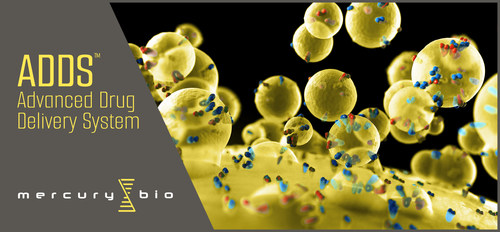SANTA FE, N.M., Oct. 26, 2022 /PRNewswire/ — Harnessing the power of naturally occurring extracellular vesicles, New Mexico-based biotech company Mercury Bio has developed patent-pending technology that will enable highly targeted delivery of both RNA therapeutics, and small-molecule drugs, to targeted diseased cells.
The recent, revolutionary use of RNA in the COVID vaccines has ushered in the broader potential of RNA therapeutics to cure many diseases, not just provide protection against them. The major challenge for RNA therapeutics is being able to deliver them to the precise cells in our body which are in need of the RNA to either silence or upregulate genes responsible for a particular disease.
Similarly, many small-molecule pharmaceutical drugs currently on the market are challenged by off-target delivery, which can result in negative side effects and low bioavailability. To complicate matters further, small-molecule drugs are often destroyed or eliminated by the body before they even have a chance to deliver treatment.
All of this adds up to a problem of ineffective drug delivery.
As Bruce McCormick, CEO of Mercury Bio states, “Curing many diseases now does not require new drugs; it needs new drug delivery systems. The ability to deliver RNA and small-molecule drugs directly to target cells is a reality that will change the way we approach disease.”
To address the problem, Mercury Bio has developed a biomolecular, advanced drug delivery system (ADDS™) that will reduce the roadblocks RNA therapeutics and small-molecule drugs encounter in vivo. By engineering naturally occurring vesicles to encapsulate RNA therapeutics and small-molecule drugs, and by modifying these vesicles to display a cell-specific targeting mechanism, challenges with drug potency and drug targeting specificity are simultaneously addressed.
Like many scientific developments, this ADDS™ was the fortuitous byproduct of a different focus. Early work researching an RNA treatment for COVID revealed that off-target drug-delivery was a critical limiting factor, just as it is with small-molecule drugs. It became clear that innovating an effective advanced drug delivery system could have very broad applications beyond combatting COVID. So, while the company began as Spartina Biotechnologies, it changed its name to Mercury Bio in 2022 to reflect its rapidly increasing focus on molecular drug-delivery technologies, taking inspiration for its new name from the Roman god of messages and communication.
Mercury Bio is now broadening operations in Santa Fe, New Mexico — adding new scientists to the team and expanding its laboratory facilities. With a growing IP portfolio that could resolve one of the most significant challenges facing an industry estimated to grow to $37 billion by 2030, Mercury Bio is also actively assembling private equity investments and pursuing new research collaborations.
To learn more about these opportunities, and to better understand how advanced drug delivery systems could profoundly impact the potency of next-generation pharmaceuticals, visit www.mercurybio.com
Contact:
Bruce McCormick
800-274-8533
347459@email4pr.com
SOURCE Mercury Bio LLC


